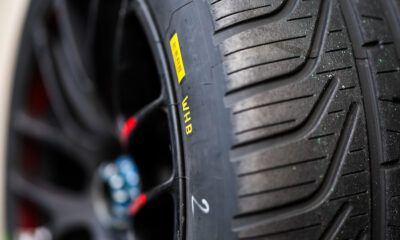Audi has launched a second evolution package for the R8 LMS GT3, extending the lifespan of the German manufacturer’s flagship mid-engine racing sports car model line.
As reported in December, Audi is updating its long-serving GT3 racer with an Evo kit that will be available for customer teams to run from the start of 2022.
Audi says that it has “optimized” the R8 LMS GT3 Evo in this second evolution package, christened the evo II, for “better driveability” across five key areas including aerodynamics, traction control, engine characteristics, chassis and climate control.
The original Audi R8 LMS GT3 was launched at the 2015 Geneva Motor Show as a successor to the R8 LMS Ultra. It received an Evo update in time for the 2019 season.
The Audi R8 LM GT3 evo II will continue the manufacturer’s eligibility in global GT3 racing, including major series such as the IMSA WeatherTech SportsCar Championship and the four regional Fanatec GT World Challenge powered by AWS competitions.
“With the first evolution of 2019, we have already embarked on a path that focuses more strongly on the customer teams and the wishes from amateur sport,” said Chris Reinke, head of Audi Sport customer racing.
“We have now maintained this direction with many new ideas. Whether it’s engine characteristics, interior climate control, chassis, or traction control, we have consistently implemented the wishes that our globally active teams have brought to us.
“The new evolution meets the needs of our customers even more. The majority of the innovations reflect the wishes that the teams have expressed to us.”
Audi points to the rear wing as the main visual change on the Evo II, drawing similarities to the aero devices found on the back of Audi’s current GT2 and TCR racing vehicles.
The updated rear wing generates more downforce than the previous iteration and shifts the majority of downforce generation from the underfloor to the rear of the car, in a development that is designed to make the vehicle “less sensitive” under braking.
Audi has retained the 5.2-liter V10 engine that powered its R8 GT3 predecessors but has developed a new intake system for the Evo II. The engine, which is developed on the road car assembly line, maintains its 10,000 km service and 20,000 km rebuild intervals.
The traction control system has been updated, while four-way adjustable shock absorbers have been fitted in place of the original two-way shocks. An air conditioning unit that extracts heat from the cockpit via a refrigeration circuit has also been installed.
“The innovations improve the driveability and they allow drivers without a professional background in particular to make better use of the power potential and torque curve for consistent lap times,” said Reinke.
“Air conditioning makes it easier to concentrate in the cockpit even over long distances.
“The chassis features a new shock absorber solution that makes it easier for the teams to set the car up. And modified software means that traction control can be used even more individually to suit individual needs and different tire characteristics.”
Audi is due to finish testing the second Evo this year ahead of its global rollout in 2022.
The car is on the market at a price of €429,000 ($505,000 USD), making it €31,000 more expensive than its predecessor’s 2019 launch price. Audi has not confirmed a price for retrofitting R8 LMS GT3 Evo cars with the Evo II specification.
“The economy of the evolution package is a key differentiator for Audi Sport customer racing compared with many a competitor,” said Reinke.
“We have changed the car in five important areas. In return, the price increase from 398,000 to 429,000 euros (plus VAT) is moderate compared with the competition.
“Of course, all assemblies can be retrofitted to existing vehicles. For this fair offer, our customers receive an even better race car.”
Audi and its sister Volkswagen Group brand Lamborghini have both committed to Evo models for the next set of FIA GT3 regulations that come into effect next year.
Lamborghini is expected to introduce a second update for the Huracan GT3 Evo in 2023.


























